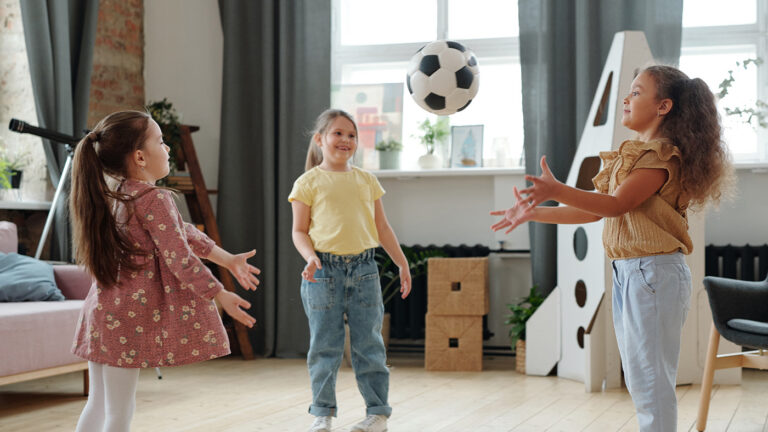Parents teach their children many things, but perhaps the most important thing you can teach them is good self-esteem. Self-esteem is liking yourself, feeling good about who you are, and finding your place in the world. It’s believing in yourself and having the confidence to tackle any age-appropriate task that might come your way. If you’re wondering how to build confidence in kids, it starts with nurturing their belief in themselves from the very beginning.
Every parent wants their children to be healthy and happy, and a strong self-image is crucial to both. You can’t always protect your children from life’s challenges, but you can let them know they are worthwhile and equip them with the knowledge that they can persevere, overcome, and adapt. Focusing on self esteem for kids is one of the best ways to support their emotional health throughout life.
Building Self-Esteem in Newborns and Babies
A healthy self-image starts being built from your baby’s earliest days and is continually shaped by their experiences. Your words and actions will be some of the most impactful in your child’s life, especially during early childhood when you make up the vast majority of their social interaction. Early child self esteem development begins the moment your baby feels safe, loved, and secure in their environment.
Newborns may not know much yet, but they know when they are loved. Respond when your baby cries and spend time cuddling and talking with them. Sing songs, smile, and be a safe and consistent presence. Those early weeks and months may seem less critical to your child’s sense of self than the school friends they’ll make or their first broken heart, but you’re laying the foundation for how the world greets your child and how they greet the world in return. This early stage is vital for building confidence in kids that will last a lifetime.
How to Build Better Self-Esteem in Kids
As your child gets older and starts to discover everything the world has to offer, try to match their excitement and wonder. They are experiencing everything for the first time and looking to you to determine how they should feel. Here are some suggestions for helping your child feel good about themselves even through hard times.
- Help your child learn: Parents and caregivers teach everything from walking and talking to riding a bike and tying shoes. Each new skill and every challenge overcome helps to build your child’s confidence. Help them by demonstrating new tasks, then let your child take the lead with your guidance. As they grow, let your child make mistakes and try again without shame. Supporting your child’s confidence through learning and perseverance is key.
- Praise efforts, not results: Teach your child to set achievable goals, focusing on their efforts rather than specific results. Instead of setting a goal to play a song on the piano perfectly, set a goal to practice for a certain amount of time each day. Regardless of the result, make sure you praise your child’s effort (e.g., “I’m so proud of how hard you’re working at this” or “I can see how much progress you’re making”).
- Don’t lie: Kids know when they get unearned praise, and those hollow compliments might harm your child’s sense of self-worth. It might make them think you’re being dishonest even when you’re giving genuine praise. Instead, focus on their efforts. Even if they didn’t win or didn’t get the best score on a test, you can encourage them to try again. Being honest while encouraging effort is a critical part of how to raise confident kids.
- Model good self-esteem: Your child needs to see you demonstrating good self-esteem. You set the example for how they should think about themselves. Make your best effort in everything you do, focus on your strengths, and avoid negative self-talk. If kids hear you talking badly about yourself, they’ll learn to speak to themselves in a similar fashion. Take pride in yourself, and your children will too.
- Avoid negative criticism: Kids thrive on feedback and guidance but don’t need every fault and mistake highlighted. Like adults, kids hear negative comments more strongly than positive ones. If you rush to a negative response, they’ll remember it. Instead, focus on what your child does well and help them to work through challenges. Incorporating self esteem building activities for kids into daily life can help shift the focus to growth and learning.
- Encourage healthy social interaction: Interactions with peers can build your child’s self-esteem or tear it down. Often, kids listen to their friends more readily than parents or caregivers, and they need friends who build them up. Teach your child what they should expect from a friendship and remind them they don’t have to maintain relationships with people who don’t treat them well.
- Provide service opportunities: One of the best ways to feel better about yourself is to do something for someone else. Help your child to serve their siblings, friends, and neighbors. It will help them develop a sense of value and membership in the community. These experiences also help children understand a simple confidence definition for kids: feeling good about themselves because of who they are and how they contribute.
- Try new things: Every child has their own interests and talents, but you never know what you’ll love or be good at until you try. Encourage your child to try various activities to help them find new hobbies, passions, talents, and a sense of identity.
- Encourage self-expression: Keeping a journal, telling stories, drawing a picture, or putting on a show are all ways for your child to express themselves. In addition, ask your child to share their thoughts and opinions on everything from what to have for lunch to big family decisions. Take what they say seriously and consider their suggestions whenever possible. It will help them realize their thoughts and feelings are valuable.
- Be consistent: A self-confident child knows they have value even when they fall short. If your behavior toward your child changes based on their performance, they may think your love is conditional. Tell your child you love them no matter what and remind them often.



